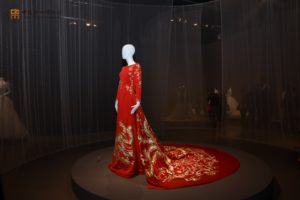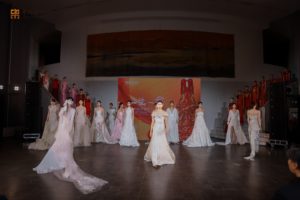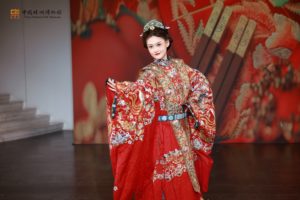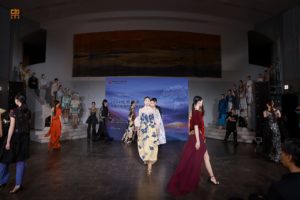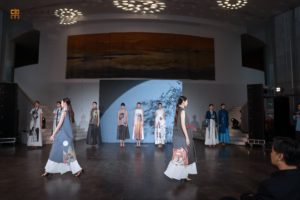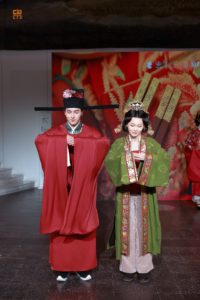November 27, 2024
The First Silk Fashion Festival Held at the China National Silk Museum Exhibition

The China National Silk Museum (NSM) recently inaugurated its first Silk Fashion Festival, a noteworthy event that underscores the museum’s commitment to preserving and innovating Chinese fashion through silk. Since its first fashion retrospective exhibition in 2011, NSM has emphasized its mission of “collecting today for tomorrow,” amassing a significant collection of classic Chinese fashion pieces and steadfastly hosting annual fashion exhibitions. These efforts have solidified NSM’s distinctive “fashion style.”
On the afternoon of November 16th, the first “Silk Fashion Festival” was officially launched at the NSM. Over 100 guests attended the event.
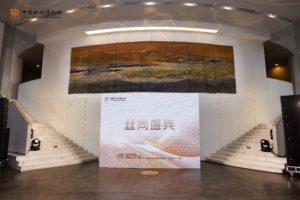
The event featured a series of activities such as fashion shows on “Silk Road Cultural Heritage Innovative Design” and Wedding Dresses, an academic salon themed with “Wedding Dresses: Research on Chinese Wedding Dresses from a Multidimensional Perspective”, exhibitions on“ Beautiful Dreams: Digital Art of Western Fashion” and “A Lifetime of Clothes–The Golden Years of Chinese Wedding Dresses” .
Highlights of the festival included:
1. “Silk Road Cultural Heritage Revitalization and Innovative Design Fashion Presentation”
At the opening ceremony of the Silk Fashion Festival, guests viewed a retrospective video from the 2024 “Silk Road Week” held at the Guimet Museum in Paris, marking NSM’s first event in the city. Director Ji Xiaofen debuted her designs, including the Tang style Ruqun series, which incorporate elements of intangible cultural heritage. She highlighted silk as a symbol of both tradition and modern fashion, emphasizing its role in celebrating the beauty of life and art. Ji described fashion as a vibrant, forward-looking art form that transcends time and space, and expressed her hope that the festival would connect NSM with the global fashion and art community, showcasing the enduring allure of silk and Silk Road culture.
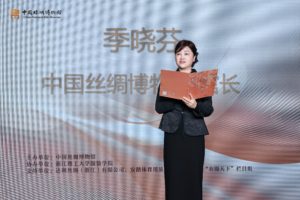
NSM teamed up with Zhejiang Sci-tech University once again to present the Fashion show, that was held in the Guimet Museum.
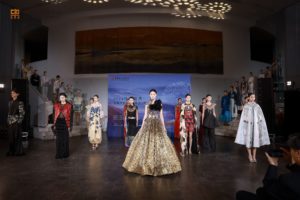
2. “Comfy Winged Horse Shoes and Apparel” unveiled
Inspired by the “Brocade with Winged Horse Pattern” of Tang Dynasty in NSM’s collection, NSM and ANTA Group jointly designed the product “Comfy Winged Horse Shoes and Apparel”. As a symbol of cultural integration, the image of the winged horse reflects a seamless blend of historical artistry and contemporary style.
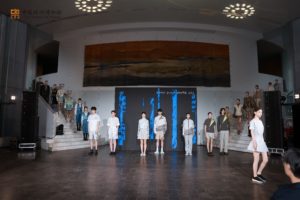
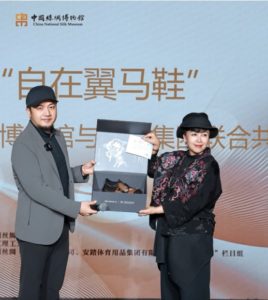
3. Cultural expression in exhibitions and fashion shows
An exhibition themed with “A Lifetime of Clothes–The Golden Years of Chinese Wedding Dresses” also opened simultaneously. Through the display wedding costumes and related cultural relics, the exhibition recounts the history and evolution of Chinese women’s costumes from the founding of the nation in 1949 to the present day with the theme of the dowry, the development of China’s wedding costume industry, the craftsmanship characteristics of wedding costumes, the culture and inheritance of ethnic minority wedding costumes, and fascinating stories of women and the dowry through different periods of history.


The wedding dress show vividly expressed people’s admiration and innovative spirit for traditional culture, featuring three series: ancient Han-style, intangible cultural heritage, and contemporary wedding dresses. Each collection, whether embracing exquisite retro elegance or modern flair, showcased a deep pride and connection to traditional cultural values.
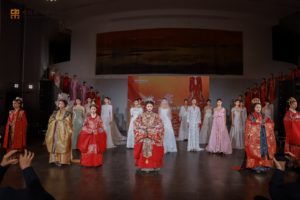
A collection donation ceremony was held to thank all sectors of society, especially industry experts and brands, for their strong support of this exhibition.
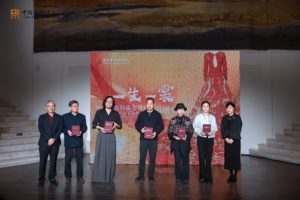
In addition, NSM also held an academic salon on “Wedding Dresses: Research on Chinese Wedding Dresses from a Multidimensional Perspective”, to discuss the historical evolution, ethnic customs, industrial development, design innovation, and the evolution of intangible cultural heritage of the Chinese wedding dress.
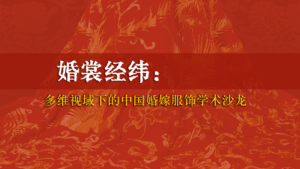
4. Exhibition “Beautiful Dreams: Digital Art of Western Fashion”
Based on the digitalization achievements of Western costumes collections, NSM also launched the first immersive exhibition featuring lighting art that focuses on the development history of Western fashion in China. This is a breakthrough attempt to digitize and dynamically display Western costume artefacts. Nearly 20 representative Western costume artefacts were selected, with the use of VR technology, vividly reproducing fashion art from the 17th to the 20th century.
The Silk Fashion Festival not only showcases NSM’s pivotal role in bridging traditional silk craftsmanship with modern fashion but also aims to project Chinese aesthetic values globally, sharing beauty universally and drawing contributions from diverse sectors to enrich the fashion dialogue.
